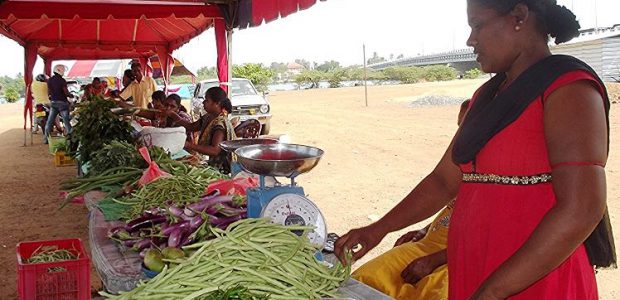Toxin-Free:
The Batticaloa Market With Better Intentions
Every Saturday, locals in eastern Sri Lanka gather at the Kalladi bridge to sell organic fruits and vegetables. But this market is more than just environmentally friendly.
Every Saturday an interesting mixture of people gather at the market held by the Kalladi bridge in Batticaloa. The market specializes in organically grown fruit and vegetables and around 1,300 farmers send their crops here. A lot of the women selling food here are war widows and the heads of their own households. Many of the latter travel a long way to get here and they come to set up their stalls before the sun rises.
Among the buyers at the bridge market, are university lecturers, doctors, government officials and managers of tourist hotels. Those who are interested in the origins of their food have formed friendships with the traders.
The prices are slightly higher – but the customers think it is worth it.
“Our vegetables are very famous now in Batticaloa,” says Chandran Dayawathie, 45, a mother of three, who started selling vegetables here around two years ago. “There is a group of people who come here to buy from us every Saturday.”
While The Catamaran was speaking to Dayawathie, a local man came by and commented on her wares. “It is a rare opportunity to buy vegetables without toxins,” he said. “There is no need to be afraid of eating those fruits and vegetables. These are healthy. That is a victory for Batticaloa.”
The food is certified clean and green by committees set up in the villages from where the crops come.
People come all the way to my home to buy vegetables, says Wasantharaja Mallikadevi, who grows her crops on two acres in Kokkadichcholai village in Batticaloa. She’s particularly proud of this because her life has been far from easy.
At first, her family was in a camp for the displaced for seven months, “When we came back there were no houses left,” Mallikadevi explains. “Elephants had destroyed everything, including what was grown in the garden. My husband is disabled and we have five daughters, only one of whom is married. I have to look after the household and all that is done with the sale of these vegetables.”
Thavarasa Thirinelli, 32, a mother of two, comes from a village in the Vakare area. She grows vegetables and she also brings dried fish to sell her. She makes up to SLR8,000 (around €39) when she comes to the market.
“My children are going to school so I must pay for that and its expensive,” she told The Catamaran. “Our only income comes from this market on Saturdays.”
The prices are slightly higher, another customer, K. Wimalanadan, concedes. But the local man, who works for the government, thinks it is worth it.
“The prices are fair,” he argues. “If the price is 10 rupees more than the regular market that is fine. There is nothing in the crops that can make you sick. People should eat what is best for the human body. After all how much do you end up paying when you get sick?”










